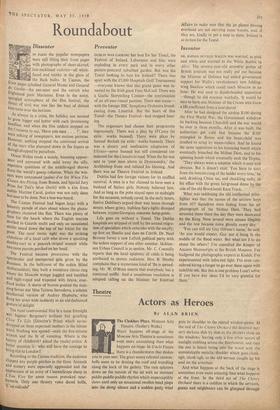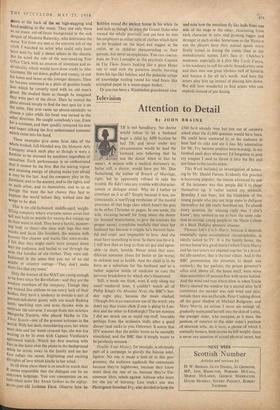Theatre
Actors as Heroes
By ALAN BRIEN WHAT happens off-stage at the Moscow Arts Theatre is sometimes even more astonishing than what happens on-stage. In Uncle Vanya „, there is a thunderstorm that shakes you in your seat. The great massy celestial cannon- balls seem to be denting the roof and trundling along the back of the gallery. The rain splatters down on the outside of the set with an insistent piddle-paddle-puddle rhythm which imperceptibly slows until only an occasional swollen bead plops into the damp silence and a sudden gusty wind puts its shoulder to the misted window-panes. At the end of The Cherry Orchard the deserted nur- sery darkens slab by slab as the shutters close on the windows, leaving only a few silver spears of sunlight stabbing across the floorboards, and then the axe is heard biting into the wood with the unmistakable metallic shudder which goes clunk- ugh, clunk-ugh, as the old servant coughs up his soul on the armchair.
And what happens at the back of the stage is sometimes even more amazing than what happens at the front. In the third act of The Cherry Orchard there is a cotillon in which the servants, guests and neighbours can be glimpsed through doors at the back of the set high-stepping and head-nodding to the music. They are only there as an ironic out-of-focus background to the sick despair of Madame Ranevsky, who dominates the scene. Yet from my seat at the extreme left of the circle I watched an actor who could only have been seen by half a dozen 'others in the theatre. But he acted the role of the non-speaking Post Office Clerk with an amount of invention and in- dividuality which would have done credit to Alec Guinness. He sat down, puffed and sweaty, to rub his knees and beam at the younger dancers. Then he became interested in a plate of goodies beside him which he covertly eyed with an old man's greed. He studied them as though he imagined they Were part of the decor. Then he moved the plate around simply to find the best spot for it on the table. One arm came up absent-mindedly to choose a cake while his head was turned in the other direction. He caught somebody's eye, froze for a moment, and then quickly retracted his arm and began talking the first embarrassed nonsense Which came into his head.
These examples give some faint idea of the Whole-bodied, full-blooded way the Moscow Arts Company attack each play as though it were a fortreSs to be stormed by sundown regardless of casualties. Each performance is so orchestrated that it cannot be the first. But the tearing vigour and straining energy of playing make you afraid it may be the last. And the company play to the furniture, and to the scenery, and to the lights-, and to each other, and to themselves, and to us as though this were the last chance they had to impress the world before they walked into the Wings to be shot.
This is an old-fashioned, middle-aged, weight- lifting company where everyone seems seven feet tall and built to wrestle for twenty-five rounds up to their waist in mud. They have a heroic, pioneer- ing look to them—the men with legs like tree trunks and faces like boulders, the women with bosoms like cheeses and waists like corn-stooks. I felt that they might easily have jumped down into the audience, and hurled us out through the exits like bundles of old clothes. They were old- fashioned in the sense that you say of an old Saddle or country cottage=They don't make them like that any more.'
Only the women of the MAT are young enough to be born since the Revolution—and they are the weakest members of the company. Though they are trained like athletes to use every inch of their bodies, they have a tendency to overdo a sort of Peasant-debutante gaiety with too much flashing teeth, sparkling eyes and arms thrown wide to embrace the universe. I except from this stricture Margarita Yurieva, who played Masha in The Three Sisters—one of• the greatest actresses in the World. With her dark, smouldering eyes, her white matt skin and her warm crescent lips, she was fire Waiting to be lit even with Captain Vershinin's splintered match. Watch her- first meeting with hint as she leans over the piano in the background While he orates away to. the family and see her face reflect the secret, frightening and exciting thoughts of love which kindle in her mind.
In all three plays there is so much to watch that it seems impossible that the dialogue can be an unknown language. You can concentrate on an individual actor like Alexis Gribov as the eighty- seven-year-old footman Fired. Observe how he bobbles round the. ancient house in his white tie and tails as though he were the Grand Duke who owned the whole province and yet how he sees his employers as either suits of clothes which have to be brushed on the lapel and tugged at the collar, or as children masquerading as their parents, but never as employers. You can concen- trate on Yuri Leonidov as the psychotic Captain in The Three Sisters looking like a giant Hitler run to seed with the pointless insults bursting from his lips like belches, and the pedantic scraps of knowledge rattling round his mad brain like crumpled paper in a waste-paper basket.
Or you can have a Wimbledon grandstand view and note how the emotions fly like balls from one side of the stage to the other, ricocheting from each character in turn, and growing bigger and stronger at each stroke. Sometimes to the Western eye the players have their animal spunk more firmly reined in during the comic than in the melodramatic scenes. Let's face it : Chekhov's weakness, especially in a play like Uncle Vanva, is his tendency to roll his subtle threads every now and then into one great obvious ball of hysteria and bounce it for all he's worth. And here the actors play him up instead of playing him down. But still how wonderful to find actors who can explode instead of just fizzing.



































 Previous page
Previous page